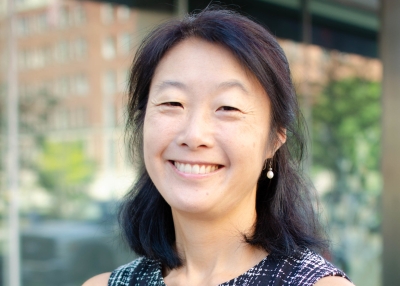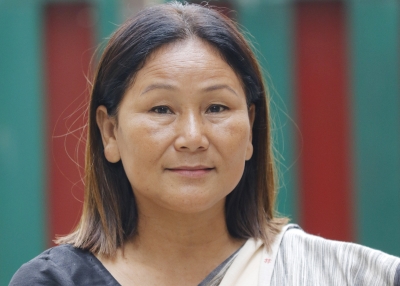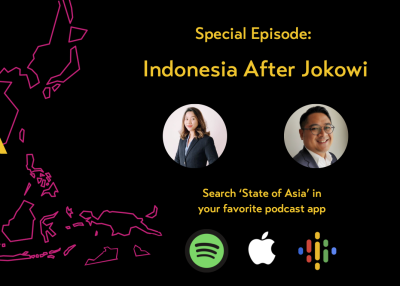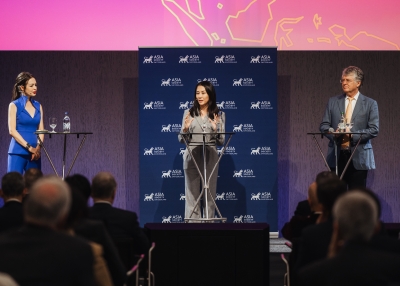State of Asia with Yuki Tatsumi
Japan’s balancing act between engaging and deterring China
GUEST ON THIS EPISODE

Yuki Tatsumi is a Senior Fellow and Co-Director of the East Asia Program and Director of the Japan Program at the Stimson Center in Washington, D.C. Before joining Stimson in 2004, she worked as a research associate at the Center for Strategic and International Studies (CSIS) and as the special assistant for political affairs at the Embassy of Japan in Washington.
She is a recipient of the 2009 Yasuhiro Nakasone Incentive Award. In 2012 she was awarded the Letter of Appreciation from the Ministry of National Policy of Japan for her contribution in advancing mutual understanding between the United States and Japan. A native of Tokyo, Tatsumi holds a B.A. in liberal arts from the International Christian University in Tokyo, Japan and an M.A. in international economics and Asian studies from the Paul H. Nitze School of Advanced International Studies (SAIS) at Johns Hopkins University in Washington.
STATE OF ASIA podcast
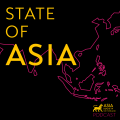
Season 6, Episode 5 – published May 28, 2024
Host/Producer: Remko Tanis, Programs and Editorial Manager, Asia Society Switzerland
Find previous and future episodes here, on Spotify, Apple Podcasts, Google Podcasts, or search for 'State of Asia' in any other podcast app. We're also on YouTube.
Transcript
00:00:03 Remko Tanis
From Asia Society Switzerland, this is State of Asia. I'm your host, Remko Tanis.
00:00:11 Remko Tanis
Japan is nervous, says today's guest, Tokyo native Yuki Tatsumi, who is now a senior fellow, co-chair of the East Asia Program and director of the Japan Program at the Stimson Center in Washington, DC.
00:00:25 Remko Tanis
Nervous about, as she calls it, Chinas sustained aggressiveness. Nervous the many skirmishes taking place in the region from Taiwan and the South China Sea to the Himalayas could quickly escalate into something way more serious. And so, Japan is beefing up its security and defense policies. In this episode, Yuki and I talk about what that actually looks like.
00:00:46 Remko Tanis
How this rhymes with Japan’s pacifist constitution, which for now still denounces war and violence as a means to solve international problems, and if there are still avenues open, where engaging with China works better than deterring the superpower next door.
00:01:00 Remko Tanis
Yuki Tatsumi. Welcome to State of Asia.
00:01:03 Yuki Tatsumi
Thank you. Thanks for having me.
00:01:04 Remko Tanis
I first wanted to look back a little bit with you. Japan had a long policy of liberal deterrence towards China, which was created way back in the 70s when China's position on the world stage was nothing compared to what it is now. Of course, I was wondering, with this liberal deterrence policy, Tokyo wanted to make Beijing aware of the advantages of working together,
00:01:22 Remko Tanis
especially economically, while at the same time making it clear what the cost would be if China were ever to become aggressive towards Japan. Very open question, how successful was Japan’s approach over the past 50 years or so?
00:01:35 Yuki Tatsumi
That is a great question. When Japan first normalized its diplomatic relations with China, like you said in back in 1970s, it did have their own rendition of responsible stakeholder policy, if you will. So, Japan's engagement with China will be primarily economic, just like Japan's approach toward many of the countries in Asia back then.
00:01:55 Yuki Tatsumi
Which is really based on the economic assistance and more like economic engagement.
00:02:00 Yuki Tatsumi
But by extension, just like Japan’s approach to, or Southeast Asia was Japan's hope for Japan, China relation was that to us, China economy grows and people get, you know, more affluent and starts enjoying the product of economic prosperity. I think Japan did have a hope that would also lead to a more open society for China.
00:02:21 Yuki Tatsumi
you know, less ideologically divided, certainly not military aggressive, but I think if we look at China today, I have to
00:02:29 Yuki Tatsumi
say that I think that liberal deterrent policy really has not worked, and that's not just by Japan, I would argue. I think United States for the longest time until just literally few years ago had a similar approach to China. But so far, I think US, Japan and I think rest of the world really tried that approach,
00:02:50 Yuki Tatsumi
they really focus on engaging China and hopefully that will groom them into a responsible major power.
00:02:56 Yuki Tatsumi
But I don't think it has turned out that way.
00:02:58 Remko Tanis
If we look now, 50 years later, Japan has a completely new sort of neighbor in China, no longer a poor nation licking its wounds from internal struggles but an economic, geopolitical and military superpower that outshines Japan in any number of metrics at the moment. Last month, Japan released its annual diplomatic Blue Book, which is a report on the country's foreign policy. In it, Tokyo stated it wants to pursue
00:03:19 Remko Tanis
a mutually beneficial relationship based on common strategic interest with China.
00:03:24 Remko Tanis
That's a reference that apparently had been absent in Japanese messaging for five years. However, the Blue Book also accuses China of unilaterally changing the status quo in the East and South China Seas, and of continuing to strengthen its military activities around Japan, making Japan’s security environment the most severe and complex since World War 2, according to the Blue Book.
00:03:44 Remko Tanis
Beijing, no surprise there, expressed its firm objection to the Japanese blue book, with Foreign Ministry spokesman Jin Liang saying that Japan had resorted to the same old false accusations against China and the hype of China's threat. What I was wondering is, with relations between China and Japan,
00:03:59 Remko Tanis
at a low, is Japan sending out mixed signals to China and is the balance between engaging and deterring China, has that gone out of whack with deterrence taking the overhand?
00:04:09 Yuki Tatsumi
Japan definitely shifted its focus on deterring China from engaging China, but at the same time, because of Japan’s geographical location, like you mentioned, you know, Japan and China will remain neighbor, geographically speaking, and that China has already surpassed Japan and you know, economic indicator. It is definitely outspending Japan in terms of defense budget and population side is far bigger.
00:04:30 Yuki Tatsumi
So, we have a very different landscape here, but because of that, because of the geographical
00:04:36 Yuki Tatsumi
Proximity even if Japan's policies shifted toward deterrence and at the moment or last few years, I think it prioritizes more deterrence aspect as opposed to engagement, it doesn't at the same time really completely cut off the diplomatic ties with China. There are still efforts that are being made not just by Japan, but in the framework of Japan, South Korea
00:04:56 Yuki Tatsumi
kind of triangle to maintain that engagement window, but I think the criticism from the Chinese Foreign Ministry is no surprise. But I would also flip back the coin to China and say, see what you're doing. You're bullying all the countries in the neighborhood that you claim to have a territorial dispute
00:05:12 Yuki Tatsumi
with because you're bigger and your foreign minister at one point said in Shangri-La, you know we're a bigger power. So the rest of you, the smaller countries, you just have to, you know, to follow our lead. How is that balancing with Chinese claiming that we're still developing country and we're, you know, our intention is peaceful. So I would just flip that coin back right in the face of China.
00:05:32 Remko Tanis
China and Japan, China and other countries in the region are at odds over a range of issues. You also mentioned the ties still between China and Japan because they are geographical neighbors. China remains Japan’s biggest trading partner. Last year, a total of 318 billion U.S. dollars. So highly intertwined economies. What options does Japan have to still increase engagement
00:05:52 Remko Tanis
to somehow maybe that way, show China that maintaining the status quo is best for everyone involved?
00:05:58 Yuki Tatsumi
So, I think for for Japan’s perspective, I think sustaining the level of economic engagement is 1.
00:06:05 Yuki Tatsumi
But then also shifting the focus away from controversial issues, so basically focusing more on cultural ties, you know, we often talk about Panda diplomacy, you know, student exchanges that certainly would be another avenue to sustain engagement and another engagement is again stepping away from those, you know, less controversial.
00:06:25 Yuki Tatsumi
Area that tends to reside on more political military security.
00:06:29 Yuki Tatsumi
But then more on issues like public health, climate policy and things like that, and try to increase the dialogue in that realm. But here I think what is increasingly concerning Japanese is the Chinese seeming increasing grip on the surveilling via what's going on inside the country, including surveilling, not just its own people’s
00:06:49 Yuki Tatsumi
movement, but then all the visitors’ movement and that is a great concern of, you know, Japan, because Japan certainly doesn't want to have to deal with the situation where China starts doing what Russia often does to its western
00:07:03 Yuki Tatsumi
visitors, which is basically randomly arresting these private citizens with the unfounded ground of espionage or suspicious activities or illegal activities according to their book, that will be one concern that Japan has, as it, if it wants to shift focus of engagement more toward people, to people, exchange cultural ties
00:07:23 Yuki Tatsumi
and continued economic exchange.
00:07:25 Remko Tanis
Japan would try to engage more in those fields even more than it has done, maybe as counterweight to the deterrence, it doesn't sound like that's a priority for the Japanese government at the moment, given Prime Minister Kishida’s speech to the US Congress in April, where he again
00:07:40 Remko Tanis
was pretty firm on China, saying things like China's military actions present an unprecedented and greatest strategic challenge to not only Japan, but the world at large. Kishida echoed statements made by the NATO Secretary general about a conflict between authoritarian and democratic states, and he even said Ukraine of today, may be East Asia of tomorrow.
00:08:00 Remko Tanis
Is that a reflection of how nervous Kishida and Japan is maybe about actual war coming to East Asia. If things keep going down the road they're on now?
00:08:08 Yuki Tatsumi
I think there is a general concern, not just from Kishida. This concern has been held pretty wide
00:08:14 Yuki Tatsumi
across the political spectrum.
00:08:15 Yuki Tatsumi
The way that Japan is increasingly nervous about saber rattling that China is showing vis-a-vis Taiwan, and again, I talk about geography, Taiwan is literally only a couple of hours away from Japan's southwestern most island. If some, you know, crisis situation happens across Taiwan Strait between Taiwan and mainland China, it can quickly escalate
00:08:35 Yuki Tatsumi
into some very serious situation that affects Japan's own security. So, Japan is definitely sounding alarm on that one. That is certainly, you know, primarily that is a reflection of that sense of crisis and then also
00:08:47 Yuki Tatsumi
so even in South China Sea, for example, if something serious happens between China and one of the claimants of their territorial dispute on that very important shipping lanes will be exposed to grave danger and which Japan very much relies on for its imports from all sorts of goods, you know, across the globe. So.
00:09:07 Yuki Tatsumi
It is really a reflection of their nervousness about how China’s sustained aggressiveness both in rhetoric and what they do. Although many of that they don't take military force, it's sometimes very aggressive Coast Guard, very aggressive
00:09:24 Yuki Tatsumi
maritime research vessels, how that could kind of escalate into something way more serious and because everybody's in such a closed quarters over there and the one of the problem is that you know, if everything something happens on you know while they're on the sea or even at airspace, it is really hard to get a truly
00:09:44 Yuki Tatsumi
objective account of what actually happened and who started 1st and it always it will be forever a case of he said, she said. But if something like that happens because everybody's so close from each other it will escalate very quickly.
00:10:00 Yuki Tatsumi
The past a few sentiment that's been expressed by Kishida and others in Japan is really reflection of that.
00:10:06 Remko Tanis
You mentioned Taiwan. You mentioned the skirmishes in the waters of the East China Sea, the South China Sea. We are breeding a lot about hearing a lot about and even seeing a lot about what's happening with the Philippines. Of course, Japan is an interesting position there. Its constitution still says it is not seeing violence as a means to solving international conflict. Its armed forces are named the self-defense Forces for a reason.
00:10:28 Remko Tanis
Yet it also has this treaty with the US that the US will aid Japan if it were necessary militarily. In return, the US is allowed to use bases in, in on Japanese territory. the US also has similar treaties with Taiwan, with the Philippines. Is Japan able to stay on the side if the US were to be called in militarily
00:10:49 Remko Tanis
to aid Taiwan or the Philippines? Or has that ship sailed for Japan?
00:10:53 Yuki Tatsumi
Based on the current bilateral security treaty, one side of the ledger is, yes, US would support Japan, defend its own territory if an invasion
00:11:02 Yuki Tatsumi
happens. The other side of the ledger is what you said in the regional conflict. US, upon consultation, US is allowed to use Japanese bases and facilities, but then also Japan Self Defense Force will provide logistical support so non-combatant support at the back end for the US military operations.
00:11:22 Yuki Tatsumi
And in reality, if it's anything regional, whether that may be Korean Peninsula or Taiwan or, God forbid, something happens in Philippines, most of the forces will be funneling through the bases across Japan. So you might want to say that, you know,
00:11:43 Yuki Tatsumi
We’re called to come to defend those partners. And you know Philippines is a more straightforward case. It's a treaty ally. Taiwan is a little bit more complicated because it's not exactly a treaty. It is the Taiwan Relations Act, which is American domestic law, which kind of, you know, sets the parameter of when the US can come to Taiwan's aid.
00:12:03 Yuki Tatsumi
And some other circumstances that US may have a second thought, for example, unilateral Declaration of Independence done by Taiwan or something like that. Right? But in in both cases
00:12:16 Yuki Tatsumi
it is, you know, Japan will be inevitably asked to at minimum support the US forces operation or logistical side in Taiwan's case, though you hear some political leaders like, you know, late Prime Minister Abe once hinted that Vice Prime Minister also had said that former Defense Minister Kishi had mentioned this in the past.
00:12:36 Yuki Tatsumi
And the kind of indirect terms.
00:12:42 Yuki Tatsumi
There are widely spreading sense amongst Japanese political leaders that Taiwan contingency would be Japanese own defense crisis because it is just so easy to bleed things over. And if that happens, then you know it's no longer Japan Self Defense Force supporting US operations, you know, help defending Taiwan.
00:13:02 Yuki Tatsumi
It is really about Japan defending its own territory.
00:13:06 Yuki Tatsumi
So that while that operation is going on across the Strait, that vulnerability is not taken advantage of in either way. I think Japan Self Defense Forces will be involved. I think that is very much the conversation is consultation is going between the two governments at the moment.
00:13:21 Remko Tanis
You also hear voices saying maybe Japan should take
00:13:25 Remko Tanis
some space from the US, just keep true to its role as an
00:13:29 Remko Tanis
East Asian Middle power, a constructive bridge builder and not as for example, China sees it, just move closer and closer to the US. What is the impact of Japan's changing security policies on intra East Asian stability and do other countries in the region outside of China see Japan as a potential stabilizer in East Asia?
00:13:48 Yuki Tatsumi
I think that is very increasing in the way that the rest of the Asia sees it, minus China, like you mentioned. Not only that I think a lot of countries in in the Pacific see Japan as a very kind of important connective node between them
00:14:02 Yuki Tatsumi
and ensuring the American involvement in the region few years ago, you know US-Philippines relations, for example, were a little bit on the rough patch because of the severe different policy differences over human rights between then President Obama and the President Duterte. But Prime Minister Abe was able to form a very good, you know, personal relationship with Duterte.
00:14:23 Yuki Tatsumi
So even when Philippine US ties were a little bit strained, you know, Japan was right in the middle, still was able to facilitate that communication.
00:14:32 Yuki Tatsumi
So I think that is the kind of the role that that the region sees. And I think that really came to the fore when eight years ago when we saw the President Trump coming into the office three days after he got into the office, you know, he withdrew US from the TPP, which President Obama
00:14:52 Yuki Tatsumi
and with his predecessor and premier Shinzo Abe worked so hard to put together and everybody was, you know, kind of there, there was a concern that what's going to happen to this multilateral thing.
00:15:01 Yuki Tatsumi
And Japan kind of stood firm and basically kept everybody but the US together. And we have CPP now. So I think that is increasing the role that Japan is playing and I think you know somewhat is expected to play.
00:15:14 Remko Tanis
Want to just briefly step aside to the relation Japan has with South Korea.
00:15:18 Yuki Tatsumi
Yeah, absolutely. That's an important one.
00:15:20 Remko Tanis
I don't know what the latest status is, but at least last year it seemed better than ever since World War 2, pretty much. How do these two countries see each other in also the security background of the region?
00:15:30 Yuki Tatsumi
That's also intricately linked with how South Korea see China. Does it see more as a security concern, or does
00:15:38 Yuki Tatsumi
It look at it more as the trade partner and then I think before the current President, President Yoon, I think the previous administration in Seoul really more looked at the PRC as more a country to engage. But I think one of the major policy shifts that happened after President Yoon came in was that one of his priority, he set it from the outset,
00:15:59 Yuki Tatsumi
that he will reset if you will Seoul’s relationship with Tokyo and put it back on the track again to a more future oriented constructive partnership.
00:16:09 Yuki Tatsumi
And I think President Yoon really stayed with that and I think by seeing him standing firm sometimes really at his own, you know, domestic, you know, domestic support rate on some of these very difficult historical issues between the two countries. I think Japan began to reciprocate and you see that really kind of unfolded last year.
00:16:30 Yuki Tatsumi
When President Yoon basically took the responsibility to solve this forced Korean forced labor issue during World War 2 into his own government's hand and say this is, you know, we will solve this by establishing
00:16:43 Yuki Tatsumi
a plan. We will still invite Japanese corporation to contribute to this fund, but it is primarily self governed. You know South Korean government’s job to
00:16:51 Yuki Tatsumi
do and then he took a lot of flack for that, you know, on both sides within Korea, cause that was really not a politically popular decision. But he stood firm with it. So I think by seeing him, that Japan reciprocated.
00:17:03 Yuki Tatsumi
Prime Minister Kishida invited President Yoon to a
00:17:06 Yuki Tatsumi
summit in Hiroshima. He and President Yoon together visited the Memorial in Hiroshima that pays respect to the Korean residents that were also perished under atomic bomb back in World War 2. And then I think that was almost like a, you know, full cycle in terms of symbolically the cycle of reconciliation. Japan-Korea relations
00:17:26 Yuki Tatsumi
are really back on track and to the more positive course. But then I think background of that is really the both countries perception toward China and approaches toward China is really converge
00:17:38 Yuki Tatsumi
from the ones that were more, you know, focused on engagement to more focused on deterrent, you know it took a lot for South Korea to make that shift. That also reflects the sense of this current administration sense of concern toward the, you know, Beijing's behavior.
00:17:58 Remko Tanis
Japan's foreign minister Yoko Kamikawa recently visit Nepal and Sri Lanka. That big country in between those two, India, what is the relations Delhi and Tokyo share at the moment.
00:18:07 Yuki Tatsumi
So Japan and India, Japan. Support within Japan toward the closer partnership with India
00:18:13 Yuki Tatsumi
has always been there. Japan always considered India as a friendly major power. I think it's the same, you know, very similar thing is happening in India, Japan front too. Obviously Japan, India relationship, you know very much focused on started from more you know economic development focused people to people exchange focus.
00:18:30 Yuki Tatsumi
Here again, Japan and India's perception toward China is again converging and more toward the sounding alarm direction. India and China. They already have a land border where they have open skirmishes every now and then so
00:18:44 Yuki Tatsumi
that's already not a great news to begin with. And then India increasingly is really not keen on China's behavior in their Indian Ocean area either. So I think that's really bringing again two countries together and its actual relationship is more complicated than that. There's, you know, economic relations.
00:19:06 Yuki Tatsumi
India's economy has its own issues, but I think for the moment, like Japan, Japan's relations with South
00:19:12 Yuki Tatsumi
Korea, Japan's relationship with India is kind of converging in the way that we're seeing right now as more of a security partner because their perception toward the Beijing is converging.
00:19:25 Remko Tanis
I don't mean to tick off a list of all countries in the world and Japan with you, but just one more if I may. Because in that same visit that Japanese Foreign Minister
00:19:33 Remko Tanis
Yoko Kamikawa made to Sri Lanka and Nepal, she also went to Africa, but she also made one stop in Europe, namely in Paris, and that was just days before Xi Jinping, the Chinese leader, went to Paris. So what is it about France that it attracts these senior Asian leaders and the rest of Europe seemingly doesn't?
00:19:49 Yuki Tatsumi
I think for Japans perspective, you know Japan and France has certain, you know, institutionalized security partnership, which I think Japan would like to reinforce. That's really coming down to it. And then also I think Japan looks at France and President Macron. You know, as one of the stronger leaders
00:20:10 Yuki Tatsumi
that are not necessarily taking those some you know, some of the extremists like more authoritarian views that seem to be held by some emerging leaders in Europe. I mean, we always talk about this as a, you know, year of election everywhere, but especially in Europe and that there is definitely a concern that the more populist for the lack of better word, but since I'm in DC, I'm
00:20:29 Yuki Tatsumi
saying it, or Trump like political leader emerging across Europe, there's definitely a concern about that. And then I think President Macron is one of the few leaders that are kind of standing still firm that are, like, clearly not. So I think there's definitely a part of that that making a stop there.
00:20:45 Remko Tanis
The late Prime Minister Shinzo Abe, famously in the last decade, started the process of adjusting Japan’s constitution. The Article 9 of the Constitution, which says Japan renounces war and use of force as means of settling international disputes. I understand many Japanese people
00:21:00 Remko Tanis
feel strong attachment to the Constitution's peaceful ideals. Then late 2022, the Japanese government announced a significant rise in military spending. The target is doubling it by 2027. That is something of that has to be paid by the Japanese
00:21:14 Remko Tanis
taxpayers, of course.
00:21:16 Remko Tanis
Can you talk a little bit about the sentiment of Japanese people? Do they feel
00:21:21 Remko Tanis
the changing of the security situation in the region legitimises these steps. Or are they still very hesitant and would they, kind of in denial, maybe prefer to keep things the way they were?
00:21:32 Yuki Tatsumi
I do think that there is a more widespread understanding and awareness among Japanese public that
00:21:38 Yuki Tatsumi
not just in the immediate neighborhood in Japan, but worldwide is really changing and we're seeing the situation where we never thought, you know, Japanese public never thought that it would see before what really kept it. It was, it was actually remarkable. When Japanese government came out with this new or updated security strategy, defense strategy.
00:21:59 Yuki Tatsumi
And the build up plan and one of the hallmark was like you said, bringing the defense spending up to a double by the way, talking about double. We're still talking about like slightly below NATO standard. So let's not get crazy here, so.
00:22:13 Yuki Tatsumi
So I would just say that outset, you know.
00:22:15 Remko Tanis
I heard someone say doubling the budget would finally restock the armed forces with the munition they need and everything. It's not like an expansion of what they have.
00:22:24 Yuki Tatsumi
No. So basically, you know I, I kept arguing for a long time that Japan has actually went through a lost decade almost two decade. This correlates with their, you know, economy too.
00:22:37 Yuki Tatsumi
That, as their economy stagnated, you know, Japan obviously kept its defense spending level in terms of the percentage of the GDP wise. But because the total pie is shrinking, that means Japan was spending less on defense. While that was really coincided with the period where Chinese military spending starts skyrocketing. So I think right now China outspends Japan by like 200% or
00:22:57 Yuki Tatsumi
150%. I haven't seen the latest stats.
00:23:00 Yuki Tatsumi
And then, you know, their military spending figures. Never quite transparent. Anyway, Japan is really recovering from that lost decade or two. And like I said, you know, Japan's traditional defense spending was 1% of GDP or slightly below. So it's like 0.990. So doubling that still will bring it to 1.98.
00:23:22 Yuki Tatsumi
Two point you know two point percent compared to countries like United States, which basically spends like 4% of its GDP and
00:23:29 Yuki Tatsumi
it still doesn't think it's spending, you know, spending enough. That's kind of 1 frame of mindset that I think that we have to keep in mind when we keep, you know, when we talk about doubling. But at the same time, there was definitely a significantly less pushback from Japanese public. When late Prime Minister Abe, when he was a Prime Minister, when he kind of modernized that defense and security legislation
00:23:50 Yuki Tatsumi
Back in 2015 there was a mass protest, if you, you know. I'm sure you remember the image of public surrounding the diet building and protesting, and some of the opposition leader came to protest with them. None of that happened this time around. And I think I attribute that great deal to their increasing sense of kind of insecurity, not just about China. But then when government
00:24:11 Yuki Tatsumi
was really deliberating.
00:24:12 Yuki Tatsumi
that and the media reporting on those like which direction it might go. Japanese public was seeing Russian invasion of Ukraine on TV every day. That really made them more understanding about Japan’s government needs to increase defense spending. But like you said, you know Japanese public, by and large, I think continues to have a very strong
00:24:33 Yuki Tatsumi
sense of attachment and almost a strong sense of identity in it. And the first part of that Article, 9 that you mentioned about, which is, you know, Japan will never be
00:24:40 Yuki Tatsumi
The first one to
00:24:40 Yuki Tatsumi
punch you know, to put it simply, there's definitely a strong sense of attachment to that as a kind of a national ethos.
00:24:48 Yuki Tatsumi
We're not gonna punch first. But if you, you know, if you try to punch us, we will be definitely prepared to punch you back is I think where Japan is at the moment.
00:24:59 Remko Tanis
I remember I don't know exactly how long ago it was 10-12 years ago. I was in Beijing during, crisis is too big of a word, but there were some scuffles around the Senkaku Islands between Beijing and Tokyo.
00:25:08 Remko Tanis
The anti Japanese sentiment in China was fed with great vigor with banners on the streets and everything denouncing Japan and everything that is Japanese. Japanese products were boycotted. What is the sentiment currently and among Japanese people towards China, Chinese people so not the government but more. We talked at the beginning of our conversation about the possibility of increasing
00:25:29 Remko Tanis
engagement. You would need people to be prepared to go to China or to for study or for work, or is that preparedness still there? Is that willingness still there or people turning away from that?
00:25:38 Yuki Tatsumi
Japanese at public level remains very curious about China. I think there’s definitely still a desire to learn, you know, Chinese or Chinese culture. But I think what is really hurting is Beijing restricting these people movements and that includes
00:25:54 Yuki Tatsumi
Chinese scholars visiting Japan too. It's so much more laborious for them to try to get a visa to come out or government approval to travel. What that has been doing is people in Japan really have fewer and fewer opportunity to hear directly from, you know, Chinese scholars, Chinese students. And that really hurts.
00:26:14 Yuki Tatsumi
Their, you know, willingness to visit China and then, you know, you keep, you know, they keep hearing about Chinese government oppressing like dissidents and, you know, arresting dissidents. They're getting exposed to the news media about, you know, China has this overseas police location that
00:26:29 Yuki Tatsumi
at least watches its own people that are outside China. Those doesn't necessarily turn them against China and Chinese people, but it definitely raises level of concern about, you know, visiting China. Because I can say for my colleagues in Japan who's a China scholar, there's a greater sense of anxiety
00:26:49 Yuki Tatsumi
whenever they visit China like you know, they always try to make
00:26:52 Yuki Tatsumi
sure that they are a part of this organized visiting group for like a specific conference. And for those, you know, who used to stay, extend their stay and you know meet their friends or whatever, they no longer do that. They stick with that official schedule and come back. And that is because of the concern that people are getting arrested. That's really hurting.
00:27:13 Remko Tanis
That declining people to people contact, of course, doesn't help bringing back and balance between deterrence and engagement. Thank you so much, Yuki Tatsumi for joining us.
00:27:22 Yuki Tatsumi
Absolutely. Thanks for having me.
More Episodes
-
podcast
-
podcast

